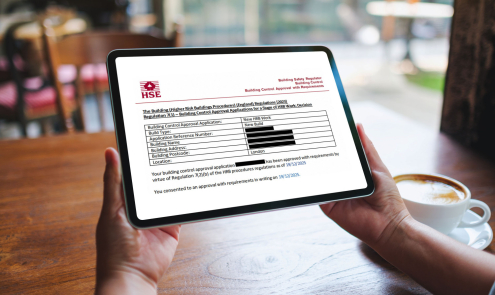A CALL TO ACTION – WHY THE CONSTRUCTION INDUSTRY NEEDS TO PLAN FOR THE FUTURE HOMES STANDARD NOW
04 Jun 2024
Alex Hill, Whitecode’s Managing Director, underlines the importance of the construction industry preparing for the Future Homes Standard now, including the effective utilisation of technology to start achieving sustainability targets as soon as possible.
Alex Hill, Whitecode’s Managing Director, underlines the importance of the construction industry preparing for the Future Homes Standard now, including the effective utilisation of technology to start achieving sustainability targets as soon as possible.
While some of the most significant building regulation changes have taken place in recent years, including those affecting Parts F, L, O and S, many are just laying the groundwork for the Future Homes Standard. This government scheme is set to be introduced in 2025, with the aim of the average UK home having 75%-80% fewer carbon emissions than those built to current energy efficient standards.
As heating and powering buildings accounts for around 30% of the UK’s total energy usage, homes and residential properties will play a hugely important role in Britain’s efforts to reach net zero carbon emissions by 2050.
However, while the proposed Future Homes Standard will help to improve the energy performance of buildings and reduce carbon emissions, housebuilders, designers, architects and contractors have plenty to do to ensure they’re ready to meet these standards next year.
What is the Future Homes Standard?
First announced in 2019’s Spring Budget, the Future Homes Standard aims to drive down the carbon footprint of any homes built after 2025. These regulations proposed changes to efficiency and ventilation requirements, as well as the role councils play in getting the best energy standards from developers.
The effective utilisation of technology and innovation, such as the latest generation of solar panels and air source heat pumps, was also proposed to help reduce the cost of keeping homes warm and tackle the looming threat of climate change.
With sustainability and energy efficiency a key focus of the Future Homes Standard, the government suggested that an average home built after 2025 should have 75%-80% fewer carbon emissions than one built to Approved Document L 2013.
Existing homes will also be subject to higher standards, with a major improvement on the standard for extensions that will see homes warmer and bills reduced. As a result, energy efficiency in existing homes will be improved, while new, greener homes will be fit for the future and help owners cut down their expenditure on energy bills.
While the Future Homes Standard doesn’t come into effect until next year, these sweeping changes and radical improvements to energy standards mean now is the time for housebuilders, developers, architects and designers to incorporate sustainability and energy efficiency in any building projects they’re working on.
Improve the fabric efficiency
With the Future Homes Standard focusing heavily on reducing heat loss and improving energy efficiency, improving insulation levels could be a significant factor for housebuilders and developers.
By adding stronger and more effective insulation, as well as minimising air leakage through gaps and cracks and addressing weak points in the building envelope, contractors and builders can help to improve fabric efficiency while at the same time reducing the need for heating systems to be used extensively.
Incorporate low-carbon heating and hot water systems
With home heating accounting for around 14% of the UK’s carbon emissions, the Future Homes Standard emphasises the use of low-carbon alternatives, like air source heat pumps or ground source heat pumps for hot water and heating. Consequently, gas boilers won’t be compliant.
Incorporating heat pumps into a new build could make a huge difference to that property’s energy efficiency. Indeed, heat pumps have a much higher efficiency than existing heating technologies, with these systems on average moving three to four times as much heat into a home as a gas boiler produces.
Furthermore, studies by the Energy and Power Group at the University of Oxford revealed that UK households could reduce carbon emissions from heating by nearly 66% in the short term by using a heat pump.
Consider the installation of solar panels
With many leading energy policymakers concerned that the UK’s power plants may struggle to meet the surging demand for energy by the early 2030s, the utilisation of more natural alternatives to fossil fuels, such as solar power, could be a significant option.
As a result, it may be prudent for housebuilders and developers to work with end users to determine the viability of installing solar panels. By doing so, not only could housebuilders take another step towards meeting the Future Homes Standard, but end users could also see a reduction in their energy bills and their own carbon footprint too.
Take advantage of energy efficient ventilation systems
Energy efficiency plays a vital role in the Future Homes Standard. As such, developers and housebuilders may want to incorporate energy efficient ventilation systems, such as MEV and MVHR systems.
These systems extract stale air from the home and replace it with fresh, filtered air, offering not only air quality benefits but also a consistent temperature and enhanced comfort while using less energy. This essentially means that energy bills can be lowered and carbon footprints reduced.
With less than a year before the Future Homes Standard regulations are introduced, now is the time for the construction industry to plan ahead. By doing so, housebuilders, property developers and contractors can get a head start on meeting sustainability targets and improving the safety and quality of any building they work on.

WHITECODE CONSULTING GAINS HIGHLY...
As a company that prides itself on sustainability in design and exceeding – not just meeting – industry standards, Whitecode Consulting is delighted to announce it has gained the coveted Chartered Institution of Building Services...
Read More
Passing Gateway Two: What you need to know...
Gateway Two is a key aspect of building safety and quality. However, the Building Safety Regulator’s (BSR) approval process is causing significant backlogs in UK construction projects. While indications suggest the BSR itself...
Read MoreLike to Know More? Let's Talk...







